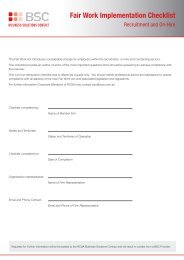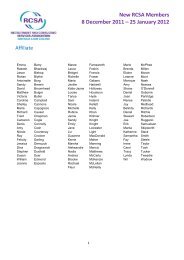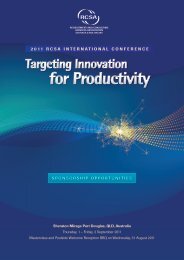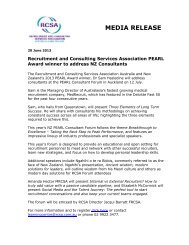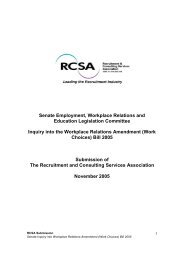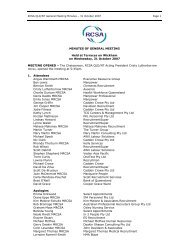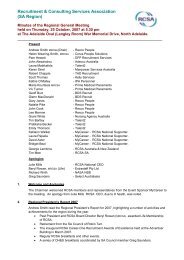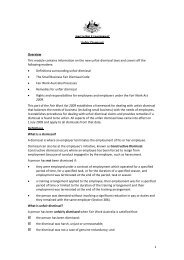June 2012.pdf - RCSA
June 2012.pdf - RCSA
June 2012.pdf - RCSA
Create successful ePaper yourself
Turn your PDF publications into a flip-book with our unique Google optimized e-Paper software.
focus: RECRUITMENT AT THE SPEED OF TOMORROW<br />
How to hire smart people<br />
Being interviewed to work at McKinsey<br />
was one of the more interesting<br />
experiences of my earlier life. Ten<br />
rounds of interviews, rigorous analytical tests,<br />
bizarre psychometric probes and a final cup<br />
of coffee with a senior partner of the firm<br />
that felt like a scene from a John Grisham<br />
novel – and voila, I was in. The story about<br />
how I never actually turned up for work is<br />
one I’ll save for another day. But I do<br />
remember one thing from the process –<br />
McKinsey were obsessed with finessing their<br />
strategy of hiring and retaining “smart people”.<br />
The concept of<br />
work has never been<br />
more challenging.<br />
<strong>RCSA</strong> Conference presenter<br />
Mike Walsh is a futurist, keynote<br />
speaker and innovation coach.<br />
After one of the interviews, a manager<br />
at the firm described their ideal archetype as<br />
a “spiky integrator”. In essence, their perfect<br />
candidate was someone who had an<br />
extraordinary talent spike (e.g. genius chess<br />
skills, Olympian athletic discipline or knowing<br />
six languages), but was also capable of<br />
integrating that skill across a range of other<br />
capabilities and in association with other<br />
team mates. Or to put it another way – they<br />
wanted freaks with social skills. The only<br />
problem with that personality type, as many<br />
companies discovered when they put former<br />
high flying management consultants into<br />
leadership teams – is that spiky integrators<br />
need to be surrounded by other super smart<br />
people in order to thrive. Out of the fish tank,<br />
they don’t survive too long.<br />
For companies today, hiring smart people<br />
is still a critical priority. And it’s harder than<br />
ever. The digital revolution has had two<br />
major impacts on the war for talent. Firstly,<br />
you are now competing with the fact that<br />
the best candidates can earn significant<br />
incomes as free agents. With the web<br />
offering a global customer base and infinite<br />
opportunities for fame, being a digital ronin<br />
or an entrepreneur has never been more<br />
seductive. But the second impact is just as<br />
profound. The concept of work has never<br />
been more challenging. Traditional industries<br />
are being disrupted, competition more<br />
nuanced, and the demands on managers<br />
more pronounced. Your old school spiky<br />
integrator might be able to draw up some<br />
rather pretty strategy slides describing your<br />
industry – but will they have the level headed<br />
poise to ruthlessly execute and get things<br />
done in an increasingly ambiguous and<br />
uncertain operating environment<br />
In the future, I think there will be three<br />
capability attributes that senior managers<br />
will need to look for in their top performers:<br />
1. Super Synthesisers<br />
In the old days, smart employees gathered<br />
competitive information in traditional ways<br />
– phone interviews, focus groups and industry<br />
surveys. Basically – you were clever if you<br />
knew how to pick up the phone and make<br />
some calls. Now we have the opposite<br />
problem – too much information. Super<br />
synthesisers are people with the capability<br />
of scanning and processing huge amounts<br />
of information. They are like human meta<br />
filters. With enough technical savvy and<br />
familiarity with blogs, social platforms and<br />
search algorithms – they can assess the<br />
topography of available data, see patterns<br />
and collate them as trends, prioritise and<br />
then act.<br />
2. Hyper Connectors<br />
One of these days we will laugh about<br />
the fact people used to get fired for using<br />
Facebook or LinkedIn at work. Hyper<br />
Connectors are people who know how to<br />
swiftly build and exploit relevant networks to<br />
get things done. They won’t necessarily have<br />
the largest collection of contacts, but they<br />
will know how to use digital platforms to find<br />
and nurture just the right set of people to<br />
reach their goals. These could be internal<br />
networks in a huge enterprise, or external<br />
webs of journalists, industry influencers and<br />
taste makers. You will recognise them in<br />
meetings because they are the first to say<br />
in answer to a problem, I think I may know<br />
someone who …<br />
3. Change Optimists<br />
The final quality of the future super smart<br />
might sound a bit soft but in some ways it is<br />
the most vital personal attribute – positivity.<br />
The pace of change is accelerating and there<br />
are people for whom that is good news, and<br />
others who, if they are honest with themselves,<br />
view that fact with dread. You can reassure<br />
the change pessimists about the future all<br />
you like but believe me – in the end, when<br />
faced with disruptive change, pessimists fight<br />
for the status quo not for future growth. Your<br />
best performers may not know the future,<br />
but they should be happy to meet it head on.<br />
What do you think Are there other attributes<br />
of what would make someone “super smart”<br />
in the future<br />
You can read more articles on Mike Walsh’s blog at<br />
www.mike-walsh.com<br />
14<br />
<strong>RCSA</strong> JOURNAL



